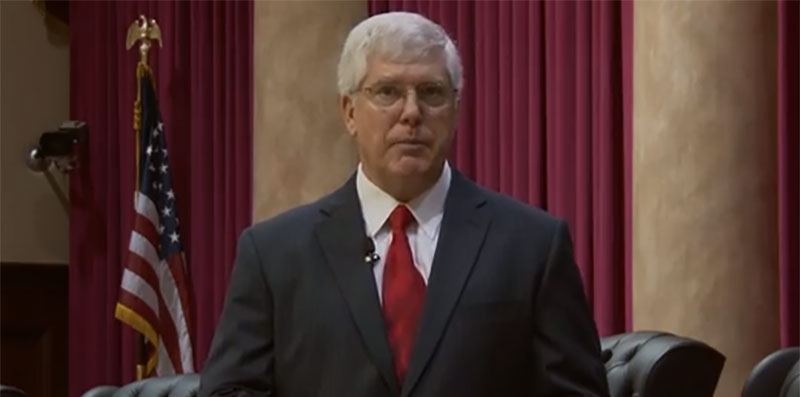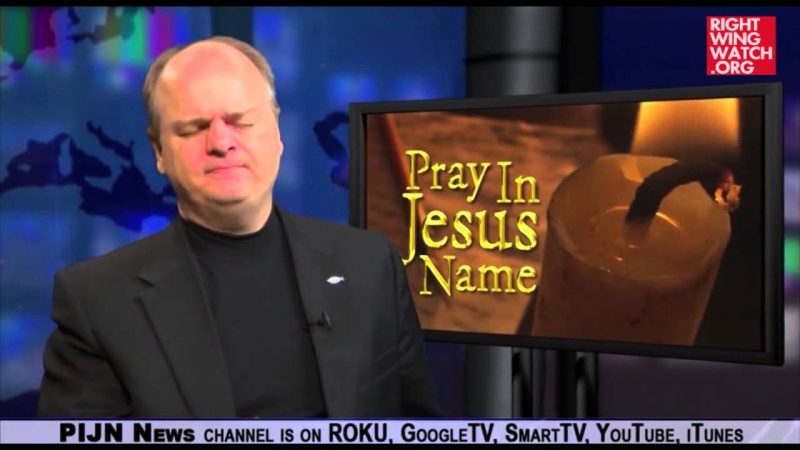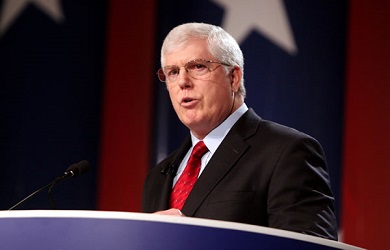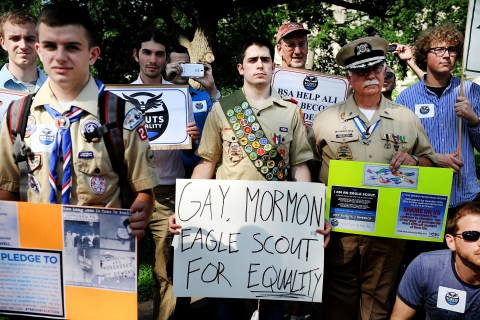Anthony Esolen of Providence College is out today with a column for the Witherspoon Institute, which funded the very much discredited Mark Regnerus study on same-sex parenting, warning about the perils of lifting the ban on gay members in the Boy Scouts.
In an essay about a young boy named Luke and his father, Esolen writes that “even savages” have rejected the idea of same-sex marriage. He also describes gays as “confused” people who “do bad and unnatural things with their bodies” and therefore “become prone to terrible disease.”
But while Luke’s dad wants his son to join the Boy Scouts, he is worried that troop leaders now have an “eye for young men” while teachers will “cheer when a boy publicizes his entry into the bizarre and self-destructive.”
Esolen warns that the Boy Scouts are transforming into the “Unisex Scouts” and that certain boys will “inevitably be enticed, by loneliness or a trick of the lewd or boredom or a desperate need to be noticed or a despair that they could ever become true men, into the life of the male forever seeking the male.”
I see a boy.
Luke is ten years old. He sports a cowlick across his forehead, and a bright smile.
…
He is a boy: vir futurus, a going-to-be man. Meaning: He will join other men, brothers fighting to attain or defend the common good. Greater meaning: He is made for a self-giving that is categorically impossible among his male friends. He is made for a woman. It is the orientation of his body, in its sexual form. It is the orientation of his masculine being, developing in a natural and healthy way.
None of this should be controversial, no more than claiming that the noonday sky is blue. Should someone protest, “It isn’t so! I saw it green once, when a tornado was coming,” we’d look askance, and wonder whether he had lost the capacity for normal communication. A boy is not a girl. A boy grows up to be a man. A man marries a woman, for love and for a family: That goal is stamped upon his body. Even savages without a doctorate in philosophy can figure it out.
…
With his own sex, however, there should be naturalness and ease. So the father, on their treks alone, undresses before the boy as carelessly as he would undress before the dog, teaching the boy to do the same. The meaning is clear: You and I are alike. That is why we can do this.
…
What about aberrations? When Luke asks about them, because of things he’s heard at school, the father says that certain people are confused, and do bad and unnatural things with their bodies. They become prone to terrible diseases. But when he catches Luke in a tiff calling another boy a sissy, he reprimands him severely. Since he would not complicate Luke’s passage to manhood, he grants other men’s sons the same courtesy, especially when those boys are walking a more difficult path.
He and his wife keep destructive images out of their home. No pitching the tent beside a cesspool. Luke doesn’t have a computer or a television in his bedroom. Why should Luke be taught his morals by people who dwell in a world unparalleled for its combination of depravity, stupidity, luxury, and vanity? Better to play with his little sister and brother, and talk to his parents.
…
Of course, Luke will not be at home all the time. Lately he has been asking to join an old group called the Boy Scouts. Luke’s father has to think about this.
In a healthy time, not so long ago, he would not have had to think about it. He’d have taken for granted that his commonsense view, that a boy is a boy, avir futurus, meant in the very structure of his body to be for a woman, for the begetting and raising of children, would have been shared by everyone else. In particular, it was shared by the Boy Scouts. For the Boy Scouts were, to quote the pastor whose homily appears in the first issue of Boys’ Life magazine, to “quit themselves like men.”
The boy in the title was, if anything, more important than the scout. If a certain boy in the ranks were caught trying to entice others in things unmanly, and here I am including also the unmanly things that boys attracted to girls do, he’d have been taken aside, or sent to the counseling he badly needed, or quietly dismissed from the corps.
…
He does not want any word, or suggestion, or tale, or touch, to make Luke’s passage through the straits any more troublesome than it must inevitably be. Most especially does he not want a young scoutmaster with an eye for young men to drop a casual hint about his life, as if it were as moral as eating.
Luke’s father has a right to expect that people will not obtrude themselves into his son’s normal growth to manhood. It is wrong to lay a snare in the boy’s path. It is downright wicked to do so, when the life held forth not only frustrates the natural aims of Luke’s parents and the natural fulfillment of the boy’s masculinity, but also leaves those who are snared prone to an array of terrible diseases, both physical and moral.
He notes with wry irritation that Luke’s teachers are apt to wag their fingers at perfectly innocent things, like cupcakes in a lunchbox, but will cheer when a boy publicizes his entry into the bizarre and self-destructive.
But it isn’t just the pitfalls that the father is thinking of. It occurs to him that the Boy Scouts and he have come to an impasse. There is no reconciling them. The Boy Scouts now proclaim that there is nothing to being a boy, and nothing to the boy’s becoming a man; they might as well be the Unisex Scouts, as they are in Canada, where the scouting movement has collapsed.
…
What is the father supposed to do? He can recall that better time, that healthier time, and can name several boys he knew who, if they were boys today, would inevitably be enticed, by loneliness or a trick of the lewd or boredom or a desperate need to be noticed or a despair that they could ever become true men, into the life of the male forever seeking the male.
He knows that most of them weathered the storms, precisely because the assumption that a boy is a boy gave them protection, some breathing space, some time to sort out their feelings and to grow up. He wants for Luke some small survival of that better time.








